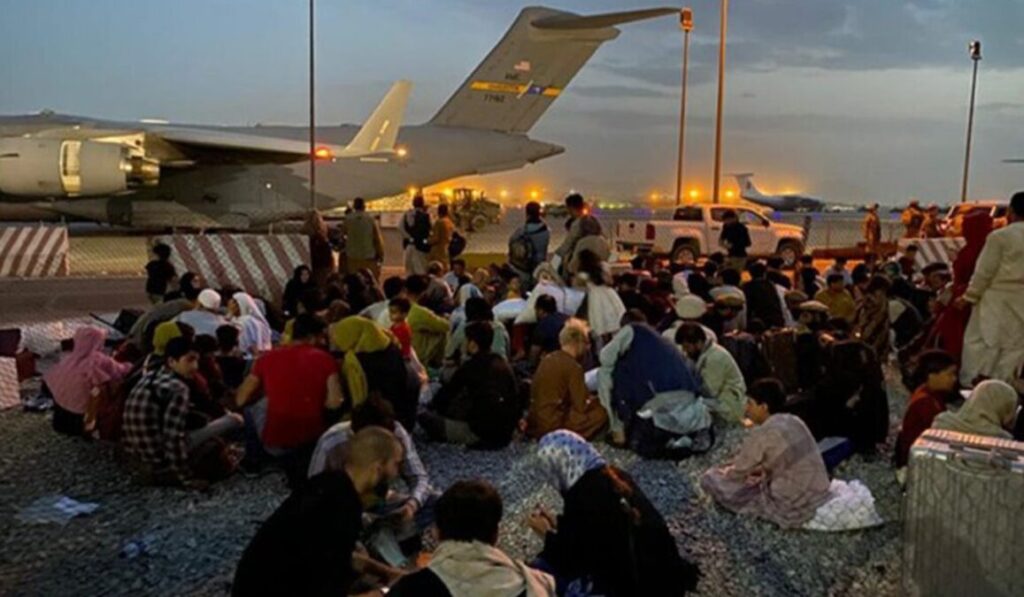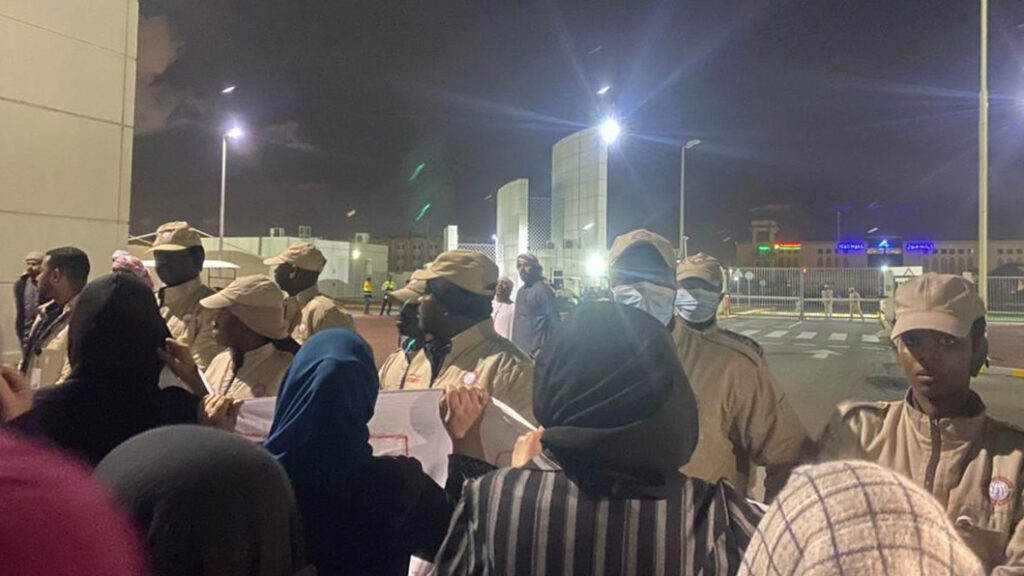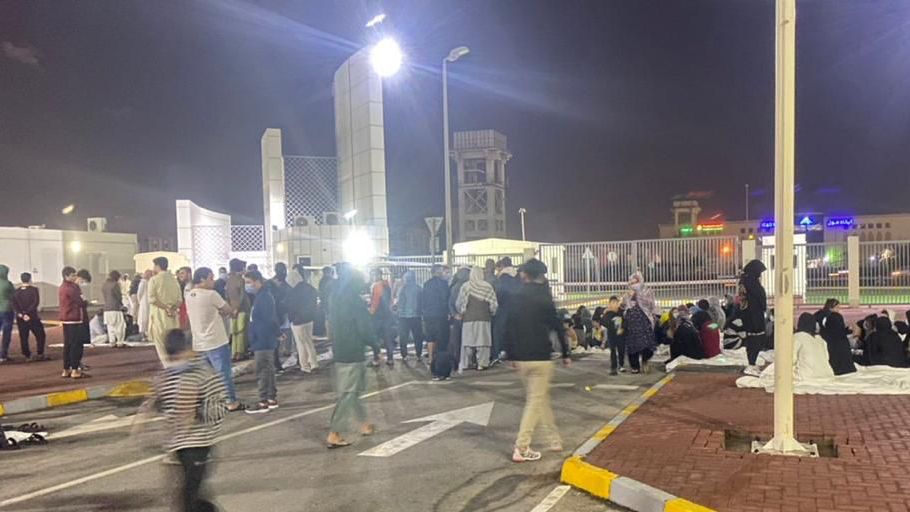Human Rights Watch has called for the urgent release of between 2,400 and 2,700 Afghan refugees who have been “arbitrarily detained” in the United Arab Emirates for over 15 months.
According to the watchdog, the UAE should urgently release the refugees and “provide access to fair and efficient processes for determining their status and protection needs”.
Following the collapse of the former government and the takeover by the Taliban, foreign governments evacuated tens of thousands of people from Afghanistan. Most were flown out of the country on chartered flights. Thousands were flown to Abu Dhabi in the UAE where they were housed at the Emirates Humanitarian City pending resettlement.
Thousands of these refugees have since been resettled in a number of countries including the US and Canada but between 2,400 and 2,700 people were still in the camp as of early January 2023.
Joey Shea, United Arab Emirates researcher at Human Rights Watch said this week in a statement that “Emirati authorities have kept thousands of Afghan asylum seekers locked up for over 15 months in cramped, miserable conditions with no hope of progress on their cases.”
“After enduring significant trauma fleeing Afghanistan, they are facing further trauma now, after spending well over a year in limbo in the UAE,” Shea said.
The refugees meanwhile have stated that in addition to the constraints on their freedom of movement, there is a lack of access to fair and effective refugee status determination and safe and legal pathways for onward movement; a lack of adequate access to legal counsel; and inadequate education services for children.
They have said there is no psychosocial support, and many adults and children are suffering from depression and other mental health conditions. In addition, their living conditions have deteriorated significantly, with detainees describing overcrowding, decay of infrastructure, and insect infestations.
“The camp is exactly like a prison,” one Afghan refugee told Human Rights Watch. Another expressed extreme frustration at the indefinite nature of his detention saying, “the big problem is we don’t know our future and we don’t know our destination.”
The two housing facilities where the Afghans are detained are apartment complexes that the UAE agreed to convert into a makeshift, government-run refugee housing facility – a facility that several refugees said they were not allowed to freely leave.
“They are permitted essential hospital visits under close supervision by security guards or minders from the camp. The only other occasion during which they were allowed to leave the camp, they said, was when authorities took a group to a shopping mall, but they were accompanied and supervised by guards throughout the visit,” the watchdog reported.
“Interviewees said that security guards are stationed at the camp gates and in every residential hall, and there are security cameras in every corridor. The camp authorities also tightly restrict visits to the complex, the residents said,” Human Rights Watch stated.

Limited legal access
Refugees interviewed said that despite trying to apply for US resettlement, they had “severely limited access to UAE or US consulate officials or other officials.”
Human Right Watch stated that it has written to the UAE’s ministries of interior and foreign affairs and the US Department of State seeking comment about the findings. According to them, neither of the two UAE ministries have responded while the US State Department said on March 14 that “the US commitment to relocate and resettle all eligible Afghans is an enduring one. This includes those eligible Afghans located at the Emirates Humanitarian City (EHC) in the UAE.”
The State Department also said that “Emirati officials solely manage, control and operate the EHC.”
Human Rights Watch pointed out that “under international law and UN Refugee Agency (UNHCR) guidance, asylum seekers and migrants should not be detained for administrative purposes unless it is necessary and proportional to achieve a legitimate aim, and only in the absence of viable alternatives, for the shortest possible time, based on individual assessments, subject to procedural safeguards, and in accordance with defined laws and limits.”
The watchdog stated that unless these standards are met, as in the case of Afghans detained by UAE authorities, “the detention is arbitrary.”
As such Human Rights Watch called for the immediate release of the refugees, especially the children and their families.

Key Concerns
Refugees in the camp have noted their major concerns are the lack of access to legal counsel, to education for their children and the absence of keys in doors of rooms for security purposes.
They said while they have access to onsite medical care some have said they experienced difficulties with longer-term health needs, particularly those requiring specialized care.
“The health services have gotten worse, before they would take people to go to the hospital if they needed care, but now they will only take you to an outside hospital if you are in an emergency situation,” said one Afghan refugee. Another said that “the medical services are very weak.”
On October 17, Sayed Yousef Halim, a former supreme court judge in Afghanistan, died in the camp due to an apparent heart attack while he was praying. One person who knew him told Human Rights Watch that “he was alone and depressed. He was here for one year without his family.”
However, many of the refugees said there is a mental health crisis in the camp and that severe depression was widespread among both adults and children.
Human Rights Watch learned of at least one suicide attempt at Humanitarian City. According to the watchdog, the man was taken to hospital and then returned to the camp. “He is still suffering from mental health problems,” the watchdog stated.
The Asylum Situation
As of September 2022, the US government had admitted approximately 88,500 Afghans as part of “Operation Allies Welcome,” though thousands more remained stranded overseas. Human Rights Watch reported that unlike the more than 70,000 Afghans directly evacuated and swiftly admitted to the US in 2021, many Afghans flown to the UAE after August 31, 2021, have faced slower, case-by-case US immigration reviews, with no guarantee of US admission or resettlement.




